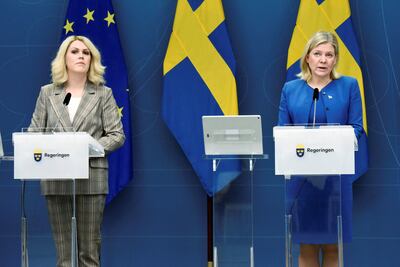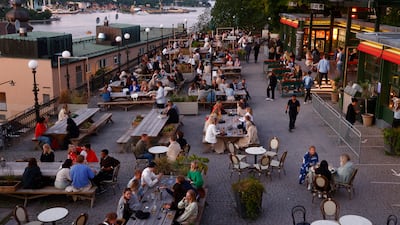Sweden is poised to lift almost all its coronavirus restrictions next week, joining its Nordic neighbours Denmark and Norway in sounding the all-clear.
The move will make Scandinavia one of the most open regions of Europe, while neighbours to the south such as Germany and Austria continue to put the brakes on public life.
“It's time to open Sweden up again,” prime minister Magdalena Andersson told a news conference on Thursday.
The use of vaccination certificates, a 50-person cap on many indoor gatherings and early closing times for bars and restaurants are among the measures set to be abolished from February 9.
Like many countries, Sweden saw infection numbers reach a record high after the Omicron variant emerged, but deaths did not rise to the levels seen in previous waves.
“The pandemic is not over, but it’s on its way into a brand new phase,” said Ms Andersson.
Ministers will still recommend that people get vaccinated against Covid-19 and isolate when they are unwell, recalling the voluntary measures chosen by Sweden in the early months of the pandemic.
Sweden attracted both admiration and scepticism in the spring of 2020 after opting for minimal restrictions and shunning the strict lockdowns imposed across most of Europe.
The experiment had mixed results, with Sweden’s death rate comparing favourably to much of Western Europe but poorly with the relatively low numbers seen in Denmark, Norway and Finland.
Sweden’s economic performance during the pandemic has similarly placed it in the middle of the pack among wealthy countries.
Tougher restrictions were later introduced, including the 50-person limit and other measures to contain the spread of the Omicron variant.

Nordic relaxation
Denmark, which initially went for tougher measures, became the first EU country to lift all restrictions last September and repeated the move this week after bringing back some curbs because of Omicron.
People who test positive in Denmark no longer need to isolate, while masks and vaccination checks are merely recommended. There are still some restrictions at the Danish border.
“We are saying farewell to the restrictions and welcome to life as we knew it before corona,” Danish prime minister Mette Frederiksen said last week.
Denmark is one of the EU’s most vaccinated countries, with 82 per cent of the population fully inoculated.
But Ms Frederiksen said she could not guarantee that it was a “final goodbye to restrictions” because of the possibility of dangerous future variants.
Norway similarly scrapped most measures this week, lifting a 10-person cap on private gatherings and allowing fans to sit elbow-to-elbow again at sports events.
However, people will still be asked to wear a face mask in crowded settings if they cannot keep a metre apart from others.
The government said that although infection numbers were high, vaccinations were protecting Norway from large numbers of hospital admissions.
“Now it’s time for us to take back our everyday life,” Norwegian Health Minister Ingvild Kjerkol said on Tuesday.
Finland, meanwhile, is moving more slowly to lift restrictions, with early closing times for businesses remaining in place until February 14.
The government said capacity limits at outdoor venues should also fall on that date, but that some restrictions on indoor dining may stay in force until March.


